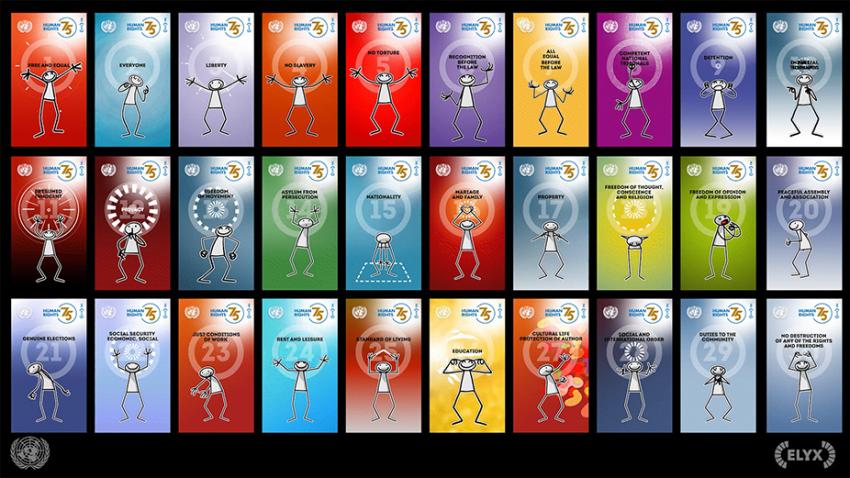The Universal Declaration of Human Rights, adopted by the United Nations in 1948, represents a monumental assertion of the inherent dignity and equal rights of all human beings. The observance of UN Human Rights Day serves not only as a commemoration of this declaration but also as an essential reminder of the ongoing struggles for human rights across the globe. The teachings of the Bahá’í Faith resonate profoundly with the principles promulgated in this declaration, emphasizing the importance of unity, justice, and the sanctity of individual rights. This article delves into the significance of UN Human Rights Day through the lens of Bahá’í teachings, elucidating why all should engage in its observance.
To begin with, the Bahá’í Faith is rooted in the concept of the oneness of humanity, a principle that asserts that all people, regardless of race, nationality, or creed, are members of a single human family. This tenet encourages a collective responsibility to uphold the rights and dignities of each individual. The observance of UN Human Rights Day becomes a manifestation of this belief, as it reinforces the necessity for solidarity and support for those whose rights are infringed upon. It underscores the interconnectedness of human beings and highlights our shared duty to advocate for justice.
Furthermore, Bahá’í teachings advocate for the elimination of prejudice as a means to achieve a just society. Prejudice, whether it be racial, gender-based, or religious, undermines the principles of equity and justice. On Human Rights Day, individuals are prompted to reflect on their own biases and the ways in which these may perpetuate injustice. This day stands as an opportunity not only for acknowledgment but also for action, encouraging individuals to dismantle discriminatory practices and champion the cause of equality.
The Bahá’í perspective emphasizes the significance of justice as a fundamental pillar of society. Just as the Universal Declaration of Human Rights established a framework for the protection of civil liberties, the pursuit of justice is central to Bahá’í teachings. Observing Human Rights Day allows individuals to critically examine the mechanisms through which justice is realized or denied within their communities and nations. Through active engagement on this day, one can join the global chorus calling for accountability, fairness, and the protection of human rights in all forms.
Moreover, the Bahá’í view of the role of government is instrumental in understanding the intersections of human rights and governance. The Faith posits that governments bear the responsibility to create and uphold laws that protect the welfare of their citizenry. On Human Rights Day, citizens are reminded of their right—and obligation—to hold their governments accountable for the protection of human rights. It serves as a catalyst for civic engagement, urging individuals to participate in the democratic process to ensure that their voices contribute to the broader discourse on human rights legislation and policy.
In addition, community involvement is integral to both the Bahá’í teachings and the observance of Human Rights Day. The Bahá’í community is fundamentally dedicated to fostering unity and collaboration among diverse groups. This principle translates beautifully into the effort to promote human rights. The observance of Human Rights Day can be transformed into a platform for interfaith dialogue, educational programs, and community service initiatives that empower individuals to take localized actions in support of universal human rights. This simultaneous commitment to spiritual development and community engagement epitomizes the Bahá’í approach to social action.
Education is another critical component of human rights advocacy according to Bahá’í teachings. Knowledge is viewed as a powerful tool in the struggle for rights and justice. Education equips individuals with the awareness and skills necessary to advocate for themselves and others. On Human Rights Day, the focus on education underscores the imperative to not only understand one’s rights but also the rights of others. It urges society to invest in education as a means of fostering a culture that respects and upholds human dignity.
In contemplating the unique implications of Human Rights Day within the context of Bahá’í teachings, it is essential to underscore the role of spiritual development in the pursuit of justice. True peace and justice manifest themselves not solely through external structures but through the internal transformation of individuals. The observance of this day provides an occasion for introspection, allowing individuals to meditate on their personal contributions to the promotion of human rights. This spiritual aspect is vital; it connects the quest for justice to a higher purpose, infusing daily actions with meaning and intention.
On a broader scale, the Bahá’í teachings illuminate the necessity of global cooperation in the advancement of human rights. As the world becomes increasingly interconnected, the importance of collaborating across borders becomes evident. UN Human Rights Day symbolizes a global commitment to recognizing and addressing human rights violations worldwide. Within the Bahá’í community, there exists a call to action that transcends national and cultural divides, advocating for a unified approach to the challenges faced by humanity.
In conclusion, the observance of UN Human Rights Day embodies the essence of Bahá’í teachings, emphasizing the oneness of humanity, the pursuit of justice, and the imperative for community engagement. It encourages individuals to reflect upon their responsibilities, acknowledge the interconnectedness of their lives with others, and take actions that help promote the rights of all. As individuals unite in observance of this significant day, they not only elevate the discourse surrounding human rights but also embody the principles of the Bahá’í Faith, paving the way for a more just and equitable world for future generations.
